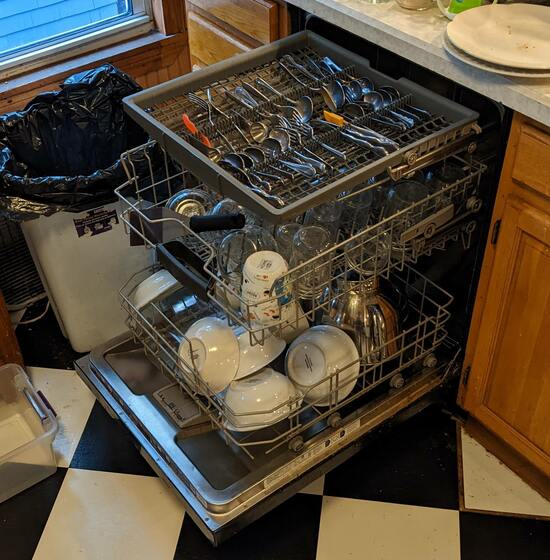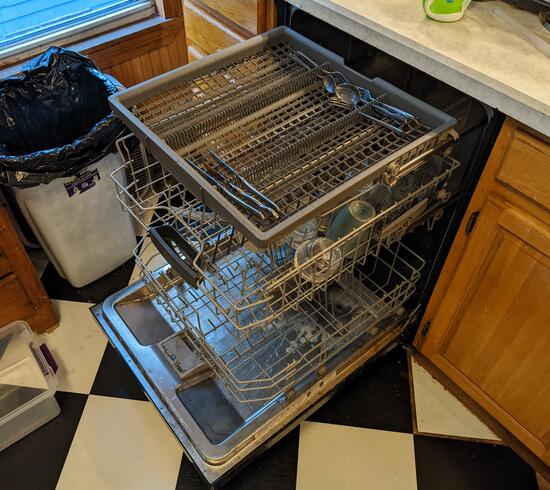Fullness to Indicate Cleanliness
post by jefftk (jkaufman) · 2022-10-11T00:40:02.150Z · LW · GW · 12 commentsContents
12 comments
Our house has a simple system for the dishwasher: when you're emptying a rack, empty it all the way and push it in. This means that if you come across a dishwasher with a partially-full rack you know it's dirty and can put things in without checking. It's a lot more reliable than clean/dirty toggle magnets, because it can't be "out of sync".
Clean:
Dirty:
This system works especially well for us because of how many people we have in the house. It's not like someone living alone who will remember whether they already unloaded the dishwasher, and we're almost never running partial loads.
12 comments
Comments sorted by top scores.
comment by rsaarelm · 2022-10-11T13:56:01.072Z · LW(p) · GW(p)
Why not fill the detergent compartment immediately after emptying the dishwasher? Then you have closed detergent slot -> dirty dishes, open detergent slot -> clean dishes.
Replies from: korin43↑ comment by Brendan Long (korin43) · 2022-10-11T19:51:39.897Z · LW(p) · GW(p)
This is what me and my roommate do and it works great. Filling the detergent slot when you finish unloading the dishwasher takes almost no time, and it's a very obvious signal.
comment by gwern · 2022-10-11T00:48:15.852Z · LW(p) · GW(p)
I am confused by this post in part because I had never conceived before of dishwasher systems other than "dishwashers are unloaded fully after running; dirty dishes can be put into any dishwasher not completely full or actively running". You just... mix the dirty and clean dishes constantly and people have to go rack by rack or something? How does that not lead to dirty dishes dripping onto clean and mistakes and lots of other problems?
Replies from: jkaufman↑ comment by jefftk (jkaufman) · 2022-10-11T01:00:33.672Z · LW(p) · GW(p)
We do unload the dishwasher all the way before putting in any dirty dishes. The system is for how you know whether the dishwasher contains of clean dishes that need unloading vs dirty dishes you can add to.
Replies from: gwern↑ comment by gwern · 2022-10-11T01:16:50.219Z · LW(p) · GW(p)
I'm still not following. If it has been running it will be loud and warm and full of shiny clean dishes and even if there is any free space to put a dish, it will obvious that you shouldn't. Then someone unloads it to empty and you put dirty dishes in until it's full. There's no point at which you are pushing or pulling racks and trying to encode semaphore messages or pondering the subtle points of concurrency protocols. Also, I just realized: does this mean you guys leave your dishwasher open all the time?
Replies from: jkaufman, None↑ comment by jefftk (jkaufman) · 2022-10-11T01:32:02.553Z · LW(p) · GW(p)
If it has been running it will be loud and warm
When it finishes running the dishes are still wet and can't be put away yet. Someone notices this and opens it up so it can dry out. But then you need a system for knowing whether it's clean.
does this mean you guys leave your dishwasher open all the time?
Not all the time, but often? If it's in the way we'll close it, but it's often not and so we'll leave it open to make it easier to put something in as you finish with it.
Replies from: gwern, M. Y. Zuo↑ comment by gwern · 2022-10-17T22:30:42.860Z · LW(p) · GW(p)
When it finishes running the dishes are still wet and can't be put away yet.
I disagree there too. I have, and my extended family has, my whole life always put dishes away from the dishwasher without a care about them being 'too wet', and we are none the worse for it that I can tell. They always seemed adequately dry to me.
↑ comment by M. Y. Zuo · 2022-10-11T03:04:28.101Z · LW(p) · GW(p)
I don't get it, why do you need to leave it open for such a long period that people could credibly get confused?
Can't you just dry it with towels, etc.?
Replies from: jkaufman↑ comment by jefftk (jkaufman) · 2022-10-11T10:51:54.807Z · LW(p) · GW(p)
It's a lot more work to dry dishes individually by hand than it is to leave them to air dry.
Replies from: M. Y. Zuo↑ comment by M. Y. Zuo · 2022-10-11T11:21:32.613Z · LW(p) · GW(p)
It's not though?
I'm not sure what your imagining but it's an extra few seconds per dish, when it already takes a few seconds to take the dish out and stack it.
With 50 dishes that's maybe an extra 150 seconds.
Replies from: jkaufman↑ comment by jefftk (jkaufman) · 2022-10-11T14:14:31.778Z · LW(p) · GW(p)
I don't think I can dry them quite that fast, but also I'd much rather let them air dry than spend 3 minutes individually drying dishes
↑ comment by [deleted] · 2022-10-11T01:23:55.562Z · LW(p) · GW(p)
Gwern it actually can get tricky when you have roommates that don't always obey the rules, or you run half loads because you don't want to wait and want the same pot available the next day. So that half load situation means a roommate comes along, opens the dishwasher, sees space and adds dirty.
Then I come along and unload in an order I don't see the dirty until halfway through.
Adding more permutations the dishwasher where I currently live doesn't restart when dishes are added mid load, you must actively push the resume button. So it's not uncommon for it to end up in a state where it's half dirty...

